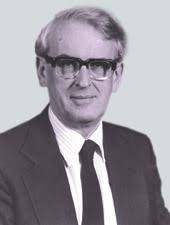
David Chilton Phillips
David Chilton Phillips, Baron Phillips of Ellesmere KBE FRS (7 March 1924 – 23 February 1999)[13] was a pioneering, British structural biologist and an influential figure in science and government.
The Right HonourableThe Lord Phillips of Ellesmere
23 February 1999 (aged 74)
Determination of the structure and catalytic mechanism of lysozyme. Contributions to the techniques of X-ray crystallography. Public service in science and government.
- Feldberg Prize (1968)[1]
- CIBA Medal (1970)[2]
- Sir Hans Krebs Medal (1971)
- Royal Medal (1975)[3]
- Charles-Léopold Mayer Prize (1979)
- Foreign Associate Member of the National Academy of Sciences (1985)[4]
- Wolf Prize in Chemistry (1987)[5]
- Gregori Aminoff Prize (1991)[6]
- Fellow of the Royal Society of Edinburgh (1991)[7]
- President's Medal (1994)[8]
- University of Cardiff (1942–44, 1947–51)
- National Research Council (Canada) (1951–55)
- Royal Institution (1956–66)
- University of Oxford
Janet Thornton (postdoc)[11][12]
Education and early life[edit]
David was the son of Charles Harry Phillips, a master tailor and Methodist preacher, and his wife, Edith Harriet Finney, a midwife.[14] His mother's father was Samuel Finney, a coal miner, union official and Member of Parliament.[13]
He was born in Ellesmere, Shropshire which gave rise to his title Baron Phillips of Ellesmere. He was educated at Oswestry High School for Boys and then at the University College of South Wales and Monmouth where he studied physics, electrical engineering, and mathematics. His degree was interrupted between 1944 and 1947 for service in the Royal Navy as a radar officer on HMS Illustrious. He returned to Cardiff to complete his degree (BSc in 1948) and then undertook postgraduate studies with Arthur Wilson. He was awarded his PhD in 1951.
Personal life[edit]
In 1960 Phillips married Diana Hutchinson. Phillips died of prostate cancer, on 23 February 1999.[23] He was diagnosed in 1988.[24]